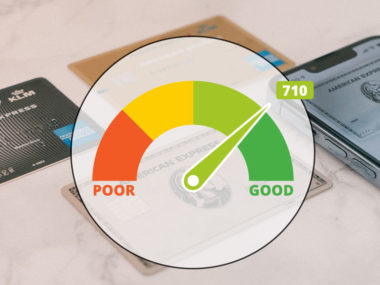
If you’re thinking about applying for a home loan, auto loan, rental property, or credit card, you’ve likely heard about the importance of having good FICO credit score. Below, we highlight what exactly a FICO score is and why it’s so important in the lending and borrowing process.
Table of Contents
What is a FICO Score?
Your FICO credit score is a metric that helps lenders, landlords, and creditors view your dependability as a borrower. In essence, it gives them an idea of your previous experience with credits and assigns a score based on five categories:
- Payment History (35 percent)
- Amounts Owed (30 percent)
- Length of Credit History (15 percent)
- New Credit (10 percent)
- Credit Mix (10 percent)
What Does FICO Stand For?
FICO credit scores, which are created by the Fair Isaac Corporation, are the among most widely used credit scores in the United States. Each year, an estimated 90 percent of lenders rely on FICO scores to help them make their lending decisions by determining your estimated level of future credit risk.
If you’ve ever applied for credit, or borrowed money for a loan, it’s highly likely that your FICO scores were heavily considered. Based on the score you have when you apply for your loan, lenders can determine not only whether or not to offer you a loan in the first place, but it also determines the terms set for your loan. IE: How long you have to pay back the loan, your interest rate, and the amount they’ll lend you.
In addition, your FICO score can also impact things like your car insurance rates, and in some rare cases, employers may evaluate your FICO scores before making employment decisions.
FICO Score vs Credit Score: What’s the Difference?
There are many credit bureaus, and each measure and monitor your overall financial health in different ways. The big three, which include Equifax, Experian and TransUnion, each compile information individually about your borrowing and spending habits, using them to create detailed reports. From there, several companies, including the Fair Isaac Corporation, use information from these reports to create a score with which lenders use to see your borrowing habits and your dependability as a borrower. In other words, your FICO score is the same thing is your credit score; FICO is just a brand name used to describe a particular way of calculating a score based on information from credit reports.
Though your FICO credit score is not the only credit score out there, it is one of the most commonly used by banks, landlords, and insurers in order to determine your eligibility and the terms they set forth going forward.
“All credit scores use the same information from your credit report, but they treat the information slightly differently to meet the needs of the particular lender,” according to Experian.
This is why you might receive a different credit score depending on which credit report you’re viewing. Some scores may be higher, and some scores may be lower depending on which scoring model you’re viewing.
FICO Credit Score Range
FICO credit scores typically operate on a scale of 300-850, though Experian notes that FICO has developed a FICO Next Generation scoring system that have scales that go up to 950.
When evaluating your own credit score you may be confused about what constitutes a “good” FICO score.
Using the FICO scale, you should be able to determine what lenders see when they evaluate your credit score when determining your creditworthiness.
- Exceptional: 800 and higher
- Very good: 740 to 799
- Good: 670 to 739
- Fair: 580 to 669
- Poor: 579 and lower
How Do I Find Out My FICO Score?
If you’re curious about what your FICO score is, there are a number of resources available to you. In fact, getting access to your official FICO credit score has never been easier than it is today.
In 2013, FICO launched the FICO Score Open Access program, which has allowed hundreds of millions of consumers to access their credit score for no cost through their financial institutions from all three of the major reporting agencies.
How Do I Get My FICO Score for Free?
Today, there is a growing list of financial institutions that offer free FICO scores, you’ll just have to do research to determine what the most feasible option is for you.
“In some cases access depends on the specific credit card a consumer carries or bank account type,” Rob Berger, a contributor at Forbes explains. For example, those who carry a Citibank Citi-branded credit card can access their FICO score based on data from Equifax. Discover, American Express, and Chase all have similar options. These types of services make soft inquiries, just looking for your raw credit score rather than examining your full credit report. This ensures you can monitor your score without lowering it with a hard inquiry.
There are many other ways to access non-FICO scores as well, that may also give you an idea of what lenders see in general, and how you can improve your score over time. Tools and websites such as Credit Sesame, Credit Karma and Quizzle offer credit scores that are quite similar to your FICO scores.
Though these educational websites are often written off as inaccurate, Berger explains that these sites are often “wrongly ridiculed.”
“An educational credit score can be a very helpful tool to understand your credit and improve your score,” Berger writes. These free tools point out definitive ways that you can improve your credit, build it over time, and quickly and easy check in.
For more information on credit scores, visit our credit score resource center. If you have found a mistake on your credit report and it is affecting your credit score, use one of our dispute letter templates to contact the credit bureaus.
Image Source: https://depositphotos.com/





